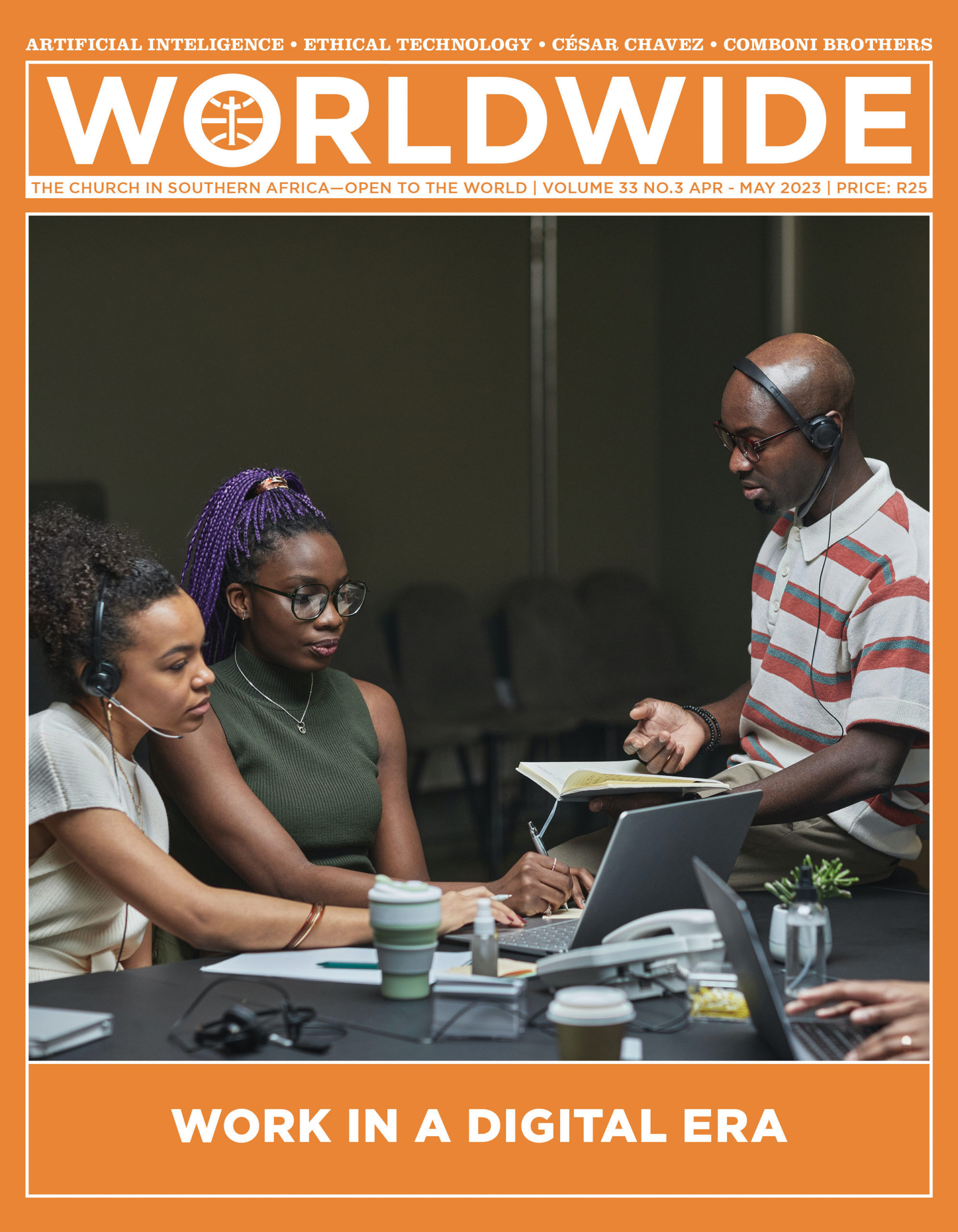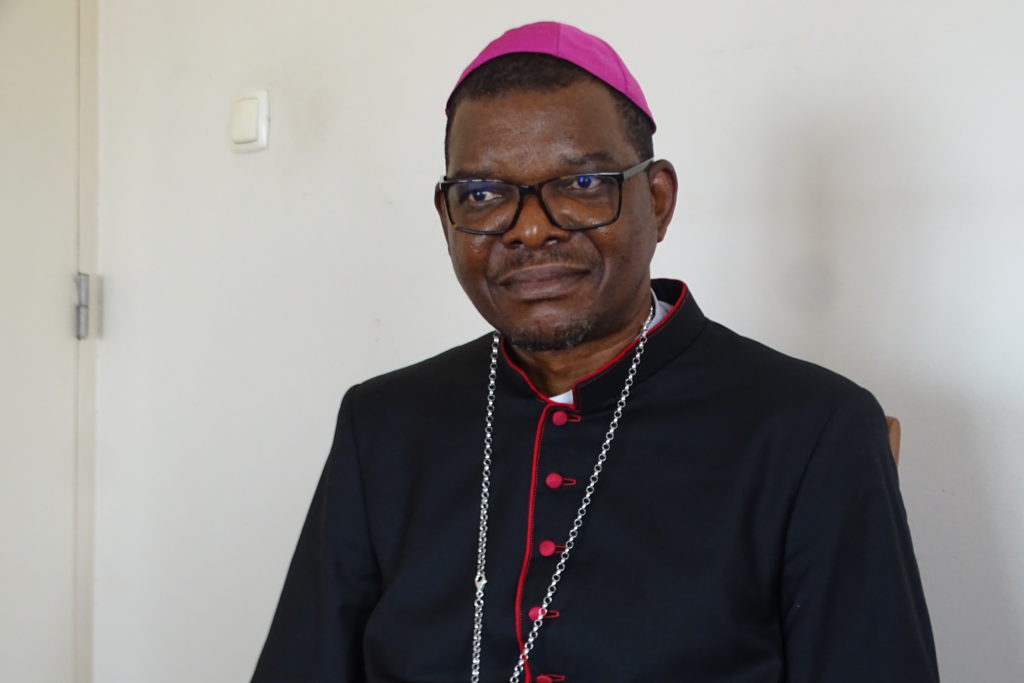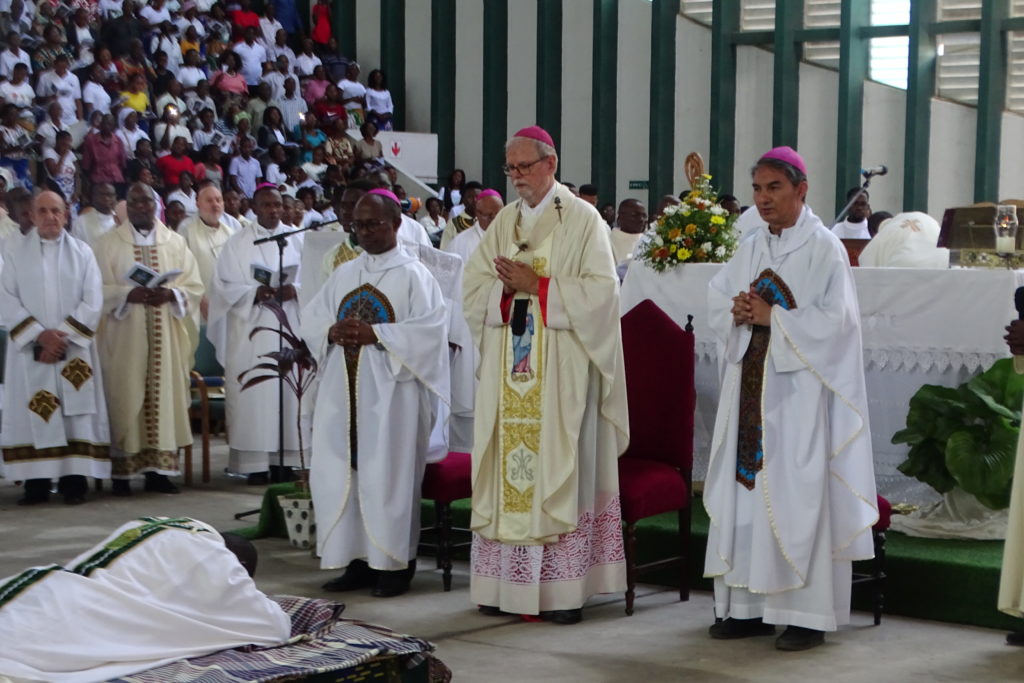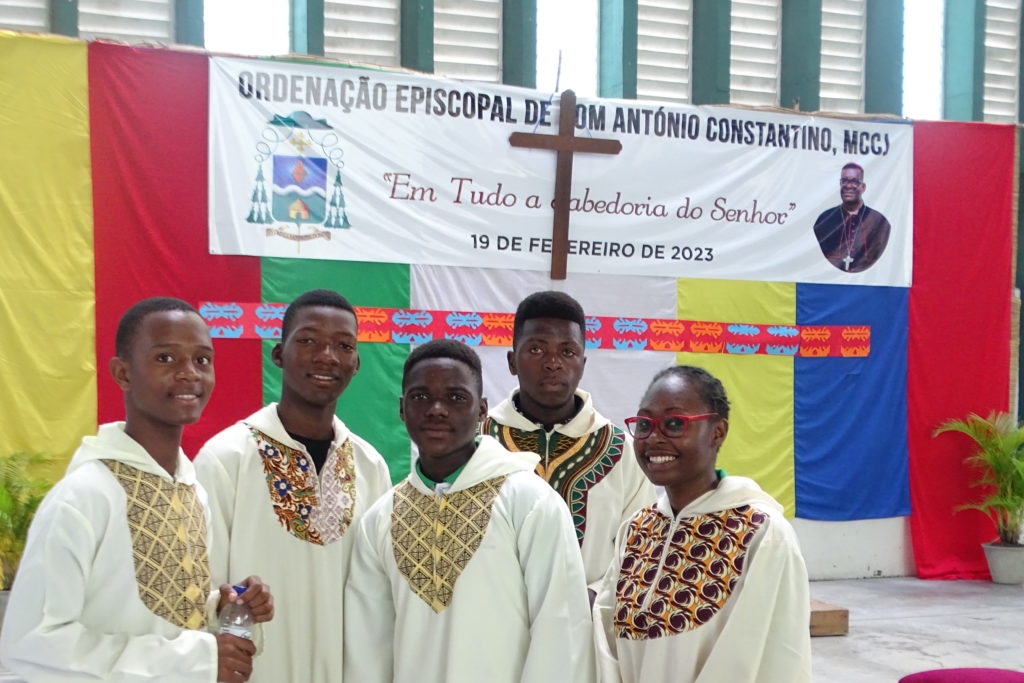
WORK IN A DIGITAL ERA
In the image we see a group of work colleagues discussing and planning their activities. They seem to have fun and an amicable relationship. The future of work passes through team work and co-operation in a spirit of mutual collaboration.
FEATURES • BISHOP CONSTANTINO BOGAIO MCCJ

‘SAVE AFRICA WITH AFRICA’
The episcopal ordination of the Comboni Missionary Antonio Constantino Bogaio as Auxiliary Bishop of Beira, took place on 19 February 2023 in the Central Mozambican city. Archbishop of Beira, Most Rev. Claudio Dalla Zuanna, the main ordaining Bishop, was assisted by Most Rev. Inácio Saúre, Archbishop of Nampula and President of the Bishop’s Conference (CEM), and Rt. Rev. João Hatoa Nunes, Auxiliary Bishop of the Archdiocese of Maputo and Vice-President of CEM as co-ordaining bishops
BY RAFAEL ARMADA MCCJ | IN BEIRA, MOZAMBIQUE
A crowd of over five thousand faithful witnessed and joyfully participated in the ceremony celebrated in the multi-purpose hall of the Railway Company of Beira. In December 2022, the nomination of Bishop Bogaio by Pope Francis, as the first Mozambican Bishop of Beira, came just after he had concluded his six-year service as Provincial Superior of the Comboni Missionaries in Mozambique. A day after the celebration, the newly ordained Bishop offered his first interview to Worldwide
How would you evaluate your experience as Provincial of the Comboni Missionaries in Mozambique?
I am grateful to those who believed in me and entrusted me with this service to my Province of origin which, nevertheless, has not been an easy one. In this ministry of leadership, you may find that each confrere has an expectation of what the Provincial can do for him and for his community. Instead, you have to look at things as a whole, considering our Comboni presence, the legacy received, the charism now flourishing in Mozambique and its impact on the local Church. We have tried to give relevance to St Daniel Comboni’s motto, ‘Save Africa with Africa’ through fostering and supporting local vocations. In fact, a Province without vocations does not have much future.

In Mozambique, we are living in a moment of a ‘vocational boom’, but the vocations are not ours, but of the Comboni Institute. Those in formation must be aware of that and the confreres too. The congregation needs to invest in the field of formation, providing enough formators in Provinces where there are many vocations, so that we can accompany them properly. This is very important because the formation phases are where we transmit the values of consecrated life, our charism in its universal dimension and we teach the candidates how we evangelize as Comboni missionaries. After the formation, some will part from their country and others will have to remain here to consolidate our presence; the Mozambique Church has always relied on the Comboni missionaries.
Another challenge is to be the first Mozambican Provincial. The Mozambican confreres expected me to be on their side and the African confreres thought: ‘now we have one of us’; also there was the anxiety of the elder confreres about what I was going to do; but I am at the service of all missionaries, our work is Catholic, as Comboni said, not Mozambican or Portuguese. This is our Comboni identity and from there is where we must start.
Our Comboni identity is very beautiful because we are called to live as Cenacles of Apostles, whereby in diversity we share our lives. Mission is not done alone, but as a community, we need each other. Another challenge I faced was how to reorganize our presence in Mozambique. We had much impact in the northern and central regions, but in the south, we have transferred many parishes to the local Church, with an intention of requalifying our presence. We had Comboni communities which served two parishes, a distance of 70 km from each other. There was a great dispersion. Therefore, the idea was to have one parish for each Comboni community. We have reduced the number of our commitments in order to consolidate our presence, a process that needs time. We have remained with 12 Comboni communities in the country. It is true that we have a decreasing number of confreres working in the Province, but we also have a future with 42 postulants, 25 pre-ostulants and novices.

Is the Mozambican Church a missionary Church?
Yes, definitely, the Mozambican Church is a missionary Church, but that dimension is now a bit shaky because we have been focusing on consolidating the local Church. We have to emphasize the missionary dimension now. We still have many places of first evangelization. The missionary dimension also includes lay evangelizers, such as many catechists committed outside the cities, in rural areas, who maintain parishes with no priest and other Christian communities. It is important to maintain that spirit.
As President of the Conference of Religious Institutes in Mozambique you were dedicated to assisting those affected by the crisis in Cabo Delgado in 2021. How have you seen that ministry and its impact on the lives of the people, even beyond its ecclesial aspect?
The first thing we tried to do was to welcome our brothers and sisters, supporting especially the consecrated who were working on the front line. The Church in Pemba, even today, is giving a great response to this situation of terrorism, welcoming the displaced population and helping them to overcome their traumas through psycho-social counselling and also to maintain their faith.
In Mozambique, we are living in a moment of a ‘vocational boom’, but the vocations are not ours, but of the Comboni Institute
Terrorism here has various aspects and interests. We do not understand the core of what is taking place. The word ‘terrorism’ hides many things. We, as the Bishop’s Conference wrote and explained, need to help especially in ending the terrorism and supporting those who know about this reality.
How do you evaluate the exercised prophetic role of the Church regarding the denunciation of social evils?
There are two aspects regarding this dimension of denunciation; we do not want more casualties, but we believe in the daily martyrdom of those who work there. It is very easy to denounce and be shot, but what is the purpose of it? Instead, every day’s commitment, giving witness to the people and making visible the reality that is causing this war—that is for me the real denunciation.
What are the social challenges in the region and those you may find in this new ministry as Auxiliary Bishop of Beira?
The level of poverty is high and this is one of the challenges. Another one is climate change with an average of 5–6 cyclones affecting this area every year. After cyclone Idai in 2019, people showed their resilience by managing to rebuild many structures and houses affected
by it, without much aid. We also need a change in our lifestyle. Mangroves are disappearing and trees are being cut down.

Another issue is inequality, with some people who own a lot while others barely have one or two meals a day. Some think that our mineral resources will save the country, but that is not the case.
Regarding my new service, I know that many people may think that I came to fulfil their expectations, but I came to evangelize. Secondly, I came to be in communion with the Church and to make the Gospel reach further. The Archdiocese has remote areas in need of evangelization. My mission is to give life and to help people to recover their ethical values.
A Church which has no sons and daughters, and does not allow her children to leave is a dead Church
I am also aware of possible conflicts among different cultural groups in the Archdiocese—but this is something often fostered by politicians who are not at the service of the people; not by ordinary citizens.
What is your dream as the new Auxiliary Bishop of Beira?
My dream is to serve the Church in the Archdiocese of Beira, together with His Grace Archbishop Claudio. My expectation is that we may shepherd and consolidate this local Church together, responding to her dimension of faith, also as priests. A Church which has no sons and daughters, and does not allow her children to leave is a dead Church. Pope Francis tells us often: go out! The local Church includes those who are present in her and those who leave as missionaries to other parts of the world. I will serve the Church with the Comboni charism, ‘save Africa with Africa’, and as auxiliary bishop, I have to assist and support the commitments of my brother His Grace Archbishop Claudio.

